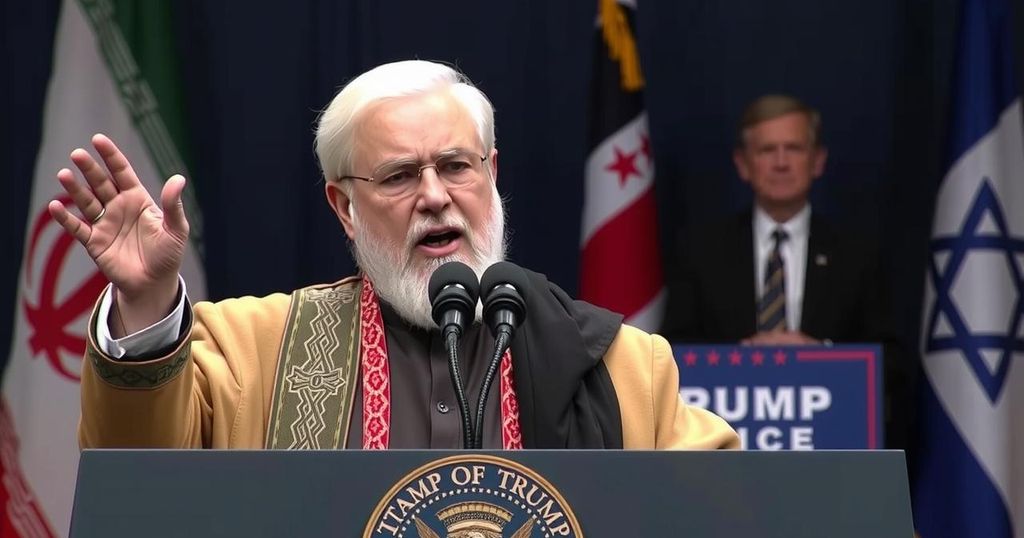Abu Mohammad al-Jolani, leader of the Hayat Tahrir al-Sham, delivered a significant victory speech at Damascus’s Umayyad Mosque, emphasizing unity among Sunni Muslims while breaking old sectarian boundaries. He targeted Iran’s influence in the region, made a notable outreach to U.S. and Israeli interests, and highlighted his commitment to reforming Syria’s drug reputation, suggesting a transformative vision for the country post-conflict.
Abu Mohammad al-Jolani, the leader of the Hayat Tahrir al-Sham (HTS) rebel group, delivered a momentous victory speech at the Umayyad Mosque in Damascus, symbolizing a noteworthy milestone in his transformation from an al-Qaeda affiliate to a commander advocating for sectarian tolerance. His choice of location, rich in historical significance, emphasized the importance of his message, which he articulated to his supporters and aimed at wider audiences, including Iran, the United States, and Israel.
In his speech, al-Jolani declared, “This victory, my brothers, is a victory for the entire Islamic nation,” emphasizing that the achievements of HTS came at a significant cost, as he highlighted the sacrifices made by martyrs and the struggles endured by detainees. He addressed the newly liberated populace, aiming to unite diverse religious groups under a common cause against the backdrop of a sectarian landscape, where Assad’s Alawite regime has historically oppressed various factions.
Al-Jolani’s rhetoric also aimed directly at Iran, signaling the end of its influence in Syria, particularly regarding its support for militant groups like Hezbollah. He mentioned that Syria had been a territory for Iranian expansionism and called for a repositioning of its geopolitical landscape. Simultaneously, his comments resonate in Washington and Tel Aviv, where he is perceived as a terrorist figure but one who understands their stakes in the outcome of the Syrian conflict.
Moreover, his outreach extended to U.S. Presidents, both current and past, indicating his awareness of international dynamics. Al-Jolani’s attempts to distance himself from extremist ideologies were showcased in a CNN interview prior to his rise, which portrayed his alignment with a more palatable political image. Following his speech, President Biden acknowledged al-Jolani’s messaging but cautioned that actions would be the true measure of his intentions.
In conclusion, al-Jolani’s speech in the Umayyad Mosque marked both a declaration of his ascendancy within the factional struggle in Syria and a strategic outreach to enhance his position among major regional and global players. His emphasis on unity and a cleaner future for Syria under HTS’s guidance portrays a leader intent on redefining his role within the complex socio-political structure of the region. Future actions will ultimately determine the viability of his promises and the sustainability of his power.
The article explores the transformation and rise of Abu Mohammad al-Jolani, the leader of HTS, within the context of the Syrian conflict. His victory speech at the historic Umayyad Mosque underscores significant themes of sectarian unity, geopolitical maneuvering, and the challenges posed by Iran’s influence in Syria. Al-Jolani’s narrative indicates a shift from extremist affiliations towards a broader appeal aimed at garnering support from various factions and external powers, pivotal for his organization’s survival in a complex regional landscape.
In summary, Abu Mohammad al-Jolani’s victory speech reflects a strategic pivot towards unity and regional influence, as he seeks to consolidate power and reshape Syria’s future. His expressions of forgiveness and reconciliation amid historical sectarian tensions suggest a calculated approach to include diverse groups, counteract Iranian influence, and position HTS favorably in the eyes of key international stakeholders. The effectiveness of these strategies will hinge on actual policies and actions taken by his leadership.
Original Source: www.cnn.com






